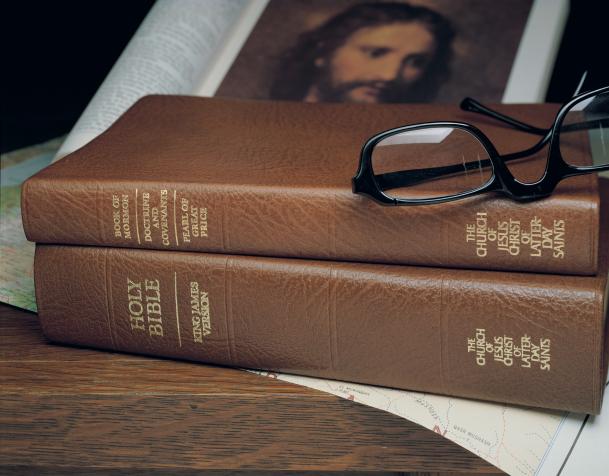Question
Dear Gramps,
Why do we speak of time and all eternity? Can eternity be subdivided? Can one be married for time and one-half of eternity?
Otis
Answer
Dear Otis,
The concepts of both time and eternity are very profound. Remembering nothing of our existence in eternity prior to our mortal birth, we are aware only of the concept of time. Since we live in time with nothing external to compare it with, we feel comfortable with the concept without really understanding it. For instance, I would imagine that a fish doesn’t know that it is wet because it has never experienced anything else.
Some things, however, we do know about the concept of time. Interestingly enough, it is of temporary duration. What does “temporary” mean? It means limited in time. Well, time is not limited in time, but it is limited in eternity. The time will come when there will be time no longer:
The seventh angel shall sound his trump; and he shall stand forth upon the land and upon the sea, and swear in the name of him who sitteth upon the throne, that there shall be time no longer (D&C 88:110).
If you would like to delve into the concept of time, you might look at an article I wrote regarding time. ( “There Shall Be Time No Longer“)
Now let’s talk about eternity. That’s like talking to a fish about the atmosphere. He can jump out of the water and briefly experience the atmosphere, but his understanding of the vast atmosphere from that brief encounter in miniscule.
Although we live in time, we also live in eternity. You might compare time to travel though a metal pipe. We enter at one end–birth, and eventually go out the other end–death. During this transition we move forward in one direction only, completely unaware of the vast universe that exists outside the pipe. But emerging from the other end we can look back and see how restricted our existence had been.
Eternity has to do with infinity–another term that we do not understand. There are mathematical definitions of infinity, but by their very nature, they defy complete understanding. For instance, the mathematical definition of infinity is, “the limit of the value of a function or variable when it tends to become numerically larger than any preassigned finite number.” We can never quite reach it.
Some idea of the concept of eternity is given in the following scriptures,
They [the angels] reside in the presence of God, on a globe like a sea of glass and fire, where all things for their glory are manifest, past, present, and future, and are continually before the Lord (D&C 130:7).
Listen to the voice of the Lord your God, even Alpha and Omega, the beginning and the end, whose course is one eternal round, the same today as yesterday, and forever (D&C 35:1).
And God spake unto Moses, saying: Behold, I am the Lord God Almighty, and Endless is my name; for I am without beginning of days or end of years; and is not this endless? (Moses 1:3)
So we see that eternity is endless–no beginning and no end. The angels who dwell in the presence of God perceive ALL THINGS, in what we in the confines of time perceive as the past, present and future. Evidently, in eternity they can look across time as we look across space, as we see the near and the far in one glance.
There are some comforting (and sobering) thoughts associated with eternity. The comforting thought is, we are indestructible, we will never cease to exist. And the sobering thought is, we are indestructible, we will never cease to exist! This brings up the crucial nature of our existence in time during mortality. Although the duration is short, it is extremely critical, for what we do here will determine FOREVER, what we will be doing in eternity.
Let me compare our transit through time to the transit of a beam of light through a prism. The constellation, Andromeda, is the most distant heavenly body that can be perceived by the unaided eye. It is two million light years away. That means that the light that we identify as Andromeda began its journey two million years ago and has traveled an uninterrupted, undeviating course for two million years and then enters our eye, exciting the optic nerve and giving us the visual impression.
Now let’s put at the ocular of our telescope a prism, so that the parallel beam from Andromeda passes through the prism, which will change its direction, and then continues onward out into space. Let’s assume that someone in some advanced civilization on some planet two million light years from our earth has his telescope focused on the prism at the ocular of our telescope and perceives the light that traveled two million years in an uninterrupted course, passed through the prism and then traveled another two million years in an uniterrupted course to the distant planet.
How much time did the light spend in the prism? Let’s say that the prism is 3 centimeters wide. The light travels through the prism in one one hundredth of one billionth of a second! That infinitesimally short time changed its course forever. Now, on what did that change of course depend? It depended on the index of refraction of the prism and on the frequency, or energy, of the light. So is our transit through mortality. We enter mortality from an infinite past; our time in mortality is as if it were one one hundredth of a billionth of a second, and then we continue in a new direction for the rest of limitless eternity. What determines the direction we will take?
That which we encounter in mortality is like the index of refraction–our environment, and how we react to that environment is like our frequency or energy–how obedient we are to the principles of the gospel. In that transit through the prism, the light passed by about two billion atoms. I can imagine that the light thought, “What are all these things doing here? Will this opposition never end? So also to us, our transit through mortality seems like a long time, but as the scriptures say, “it shall be but a small moment; and then, if thou endure it well, God shall exalt thee on high; thou shalt triumph over all thy foes.”
Gramps







